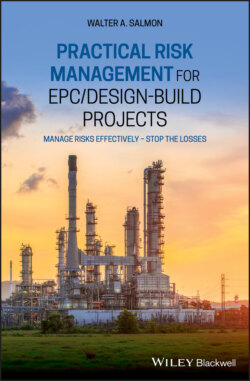Читать книгу Practical Risk Management for EPC / Design-Build Projects - Walter A. Salmon - Страница 26
2.5 EPCM Approach
ОглавлениеThe ‘EPC’ abbreviation/initialism can also be found in the term ‘EPCM’ (standing for ‘Engineering, Procurement and Construction Management’), in which the key/operative letter that distinguishes this implementation approach is the ‘M’ (Management). However, an EPCM Project is an entirely different type of construction procurement arrangement to that employed for an EPC Project but, because of the occurrence of ‘EPC’ at its start, the term ‘EPCM’ often causes confusion within the global construction industry (as observed by Loots and Henchie).6
Under the EPCM arrangement, a Management Consultant (which is, more often than not, not a Contractor) will provide the management and coordination services for the whole of the Project on behalf of the Employer. Quite often, but not always, the Management Consultant may also be responsible for carrying out the actual engineering design services. The primary functions of the Management Consultant are to assist the Employer in the procurement process and arrange for others to carry out all the necessary construction work (sometimes engaging multiple Contractors), where the Management Consultant will:
1 organise the procurement work (but not enter into agreements with, nor be responsible for paying, the Vendors and Contractors), and
2 supervise the materials/equipment deliveries and construction work (where the construction Contractors will be also appointed directly by and paid by the Employer, not by the Management Consultant).
The reasons sometimes given for employing an EPCM approach are that it can give the Employer greater control over as many elements of the implementation activities as the Employer is capable of handling (or wishes to have more control over). Such choices may cover the decision as to which concept design is to be followed, or which Engineering Team is to be appointed for the Front-End Engineering Design work and/or the Detailed Design work. Another area where the Employer may wish for greater control is in attempting to keep the procurement and construction costs down (principally by avoiding scope creep, which could otherwise lead to loss of time and also unnecessary increased costs). This greater role in the implementation process would quite obviously not be suitable for all Employers, since it would require a large contingent of people simply to handle the procurement process alone. The pressure on the Employer would be even greater if the Employer took on the added responsibility for carrying out the engineering evaluation review work or the bidding and bid evaluation work that would be necessary before orders for purchasing materials, goods, and equipment could be placed and the construction work packages awarded.
An EPCM arrangement therefore deals only with the provision of certain construction management services involved in the implementation of a construction Project, not the undertaking of any aspect of the physical work activities. However, it is perfectly possible under this arrangement for the Management Consultant to be appointed to undertake additional functions, such as producing/developing the Conceptual Design and undertaking the Basic Engineering Design work (or the Front-End Engineering Design work, dependent on the industry involved) as well as the Detailed Design work. The Management Consultant may perhaps even undertake the Detailed Design work (in circumstances where an EPC contractor will not be appointed, which would otherwise complicate the allocation of the responsibility for design and functionality risks). Additionally, the Management Consultant will usually be required to organise and supervise all the procurement work (again, where an EPC contractor is not to be appointed). The Management Consultant would not normally carry out any construction work (since that would automatically create a conflict of interest) but, instead, would usually be required to monitor the construction activities and act as the Employer's eyes and ears, in order to ensure that the facility is completed in accordance with the Employer's requirements in all respects.
The Management Consultant's responsibility for meeting the completion time requirements for a Project will also vary under an EPCM contract according to (i) the level of authority granted to the Management Consultant and (ii) the extent of the involvement of the Employer's Team in directing and supervising the other Project participants. Such a contractual arrangement therefore may or may not hold the Management Consultant responsible for timely completion of the Project, and the Conditions of Contract must be especially written for such an EPCM arrangement, since there are currently no standard forms of contract to deal with this approach to Project implementation.
The complexity of the possible EPCM arrangements is explored and explained in the PricewaterhouseCoopers (PwC) paper titled ‘EPCM Contracts: Project delivery through engineering, procurement, and construction management contracts’.7 A reading of other extant publications on the Internet will reveal widely different views as to the suitability of adopting the EPCM approach over the EPC approach. This means that it is therefore essential for the Employer to obtain competent advice about the most appropriate contractual route to take for a major Project, since the wrong choice could result in the Project being completed a lot later than the Employer requires, and at a far higher price than expected. In regard to that, Ron Douglas8 provides a series of charts to compare EPC and EPCM contracting options for the key aspects of a Project, and he observes:
... the inefficiencies of layering and bureaucracy of decision making processes in EPCM result in inefficient organisation for an extended time and higher costs result. Also, the risk remains with the client and recent performance history indicates owners are being impacted by the advice of their representatives.
Following that note, and having explained how the term ‘EPCM’ can cause confusion, I will go no further with the topic of the EPCM approach, since the primary subject matter of this book is about EPC Projects which, as demonstrated, most certainly are not EPCM Projects.
